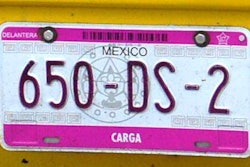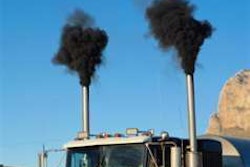In-cab air fresheners
Most of the compounds found in air fresheners sold at truck stops and grocers are generally safe when contained in trace amounts, as some are in hundreds of household products. Still, users should note label directions regarding prolonged exposure. The U.S. Environmental Protection Agency urges using air fresheners away from open flames and only in well-ventilated spaces, take heed if you tend to run for many hours while recirculating air in a closed cab.
Formaldehyde, petroleum distillates, p-dichlorobenzene and aerosol propellants are basic ingredients in most air fresheners. EPA cautions that these substances are highly flammable and can irritate eyes, skin and throat. If you’ve got an inquisitive dog in the cab, keep solid fresheners out of reach. They can be fatal when eaten.
As an alternative, try keeping sweaty socks and fast-food wrappers out of the cab. It’s good preventive maintenance.
Here’s what flows in the air when you spray Ozium sanitizer:
FRAGRANCE
The stuff you smell makes up less than 5 percent of this product. Fragrance chemicals are not required to be listed on product labels.
TRIETHYLENE GLYCOL
This has wide use as a substance that helps retain moisture in things such as tobacco products, corks, glue and paper. The EPA lists it as a hazardous air pollutant since it can damage kidneys and cause other health problems.
DI-ETHYL PHTHALATE
Label listing of DEP is not required by the U.S. Food and Drug Administration, but California banned its use and other phthalates in children’s toys last year. It’s been associated with changes in hormone levels and genital development in humans.
ISOPROPANOL
A solvent used in antifreeze, after-shave and beer manufacturing, the compound is used to help dissolve other ingredients. It makes up about half of the aero air freshener. It’s been shown to harm kidneys in rats and slow their growth.
PROPYLENE GLYCOL
You’ll find this in antifreeze and de-icing solutions, and in hydraulic brake fluids and ink. Prolonged exposure can produce health problems with this, too, warns EPA.
HYDROCARBON PROPELLANT
Two of three liquefied petroleum gases – propane, isobutene and n-butane – are used in most air fresheners. They can cause dizziness, nausea and irritations at high concentrations. Great for grilling steaks.










